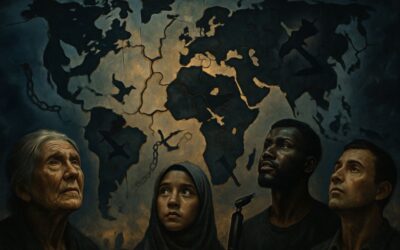The Role of Religion: Faith as a Bridge, Not a Barrier
History books paint a grim picture. Battles fought in the name of God, crusades fueled by religious fervor, and deep-seated sectarian divides that tear nations apart. It can seem easy to write off religion as a hopeless cause for peace. Yet, that view misses a crucial part of the story.
Two Sides of the Coin
Yes, religion, like any powerful human force, can be twisted for violence. Religious leaders can manipulate belief to stoke fear of the “other.” Extremists can use scripture to justify their agendas. This abuse is undeniable, and it deserves to be condemned.
But there’s another side too: the compassionate teachers within every faith who preach love and tolerance, the countless community programs powered by religious organizations to help the vulnerable, or those who find in their faith an unwavering call to work for justice.
The Power of Belief
What makes religion such a potent force? Here’s why it matters in the quest for peace:
- Moral Compass: Most faiths hold values like compassion, forgiveness, and service to others at their core. These are crucial building blocks for a peaceful world.
- Shared Language of Meaning: Religion gives people a vocabulary for the big questions in life – suffering, purpose, and belonging. This shared search creates room for connection across cultural divides.
- Community Mobilization: Religious organizations have immense grassroots power, the means to reach and mobilize people towards large-scale change.
Stories of Faith-Led Peace
The news might not focus on it, but religious peacebuilders are out there. Think of the rabbi, the imam, and the priest, who together founded an interfaith community center in a conflict-stricken region. Consider the women of different faiths who organized relief efforts after a devastating natural disaster. Picture the monastery offering refuge to those fleeing persecution regardless of their creed.
It might not be dramatic, but those acts are quietly stitching tears in the fabric of a wounded world.
Challenges and Imperatives
Religion’s path to peacebuilding is not without obstacles. It means confronting those within faiths who promote hate, engaging in difficult dialogue with those who hold drastically different beliefs, and always seeking the common ground.
A Call to Action
Whether you personally identify as religious or not, the potential of faith as a peace-making tool cannot be ignored. How can you harness this power?
- Learn about different religions: Challenge stereotypes, and seek out the common threads of humanity present in various faiths.
- Support interfaith initiatives: Help organizations that bring people of diverse beliefs together in dialogue and activism.
- Hold religious leaders accountable: Demand that they denounce violence committed in the name of faith and actively promote peace-building efforts.
Peace is not a naive dream in a world of conflicts. It takes relentless work, and religion, when guided by its highest ideals, can and must be a part of the solution.
Why Should You Care?
- Understanding a Powerful Force: Religion shapes beliefs and actions for billions of people worldwide. Grasping its potential to fuel both conflict and peace is vital for understanding the complexities of our world.
- Hope Amidst Division: In a world often polarized by differences, learning how faith communities can foster peace offers a much-needed reminder that reconciliation is possible.
- Being Part of the Solution: Whether religious or not, we all have a role in supporting interfaith initiatives and championing the positive side of religious influence.
Key Takeaways
- Religion is a double-edged sword: it can be used to incite hate or build bridges.
- Most faith traditions emphasize core values like compassion and peace, which can be incredible resources in resolving conflict.
- Religious communities and figures hold significant power to mobilize people for good.
- Faith-based peacebuilding efforts do exist, and they deserve support and recognition.
Keywords and Definitions
- Religion: A structured system of beliefs and practices revolving around faith in a higher power or powers.
- Faith: Strong belief in a higher power or spiritual principles.
- Sectarian Divides: Conflicts rooted in differences between religious branches or denominations.
- Extremists: Those who hold radical beliefs and may resort to violence to achieve their goals.
- Interfaith Initiatives: Programs or organizations that facilitate cooperation and understanding between different religious communities.
- Peacebuilding: Active efforts to create sustainable peace and address the root causes of conflict.
- Grassroots Power: The ability to mobilize and influence change at a local community level.
- Reconciliation: The restoration of friendly relations, especially after conflict.
- Religious Leaders: Figures of authority within a faith community, such as priests, imams, rabbis, and others.
- Creed: A religious belief or set of principles.
Frequently Asked Questions
- Can people with drastically different religious beliefs really find common ground? Yes! Many faiths share common values, and dialogue can focus on those shared ethical principles while respectfully acknowledging differences.
- What role can non-religious people play in faith-based peacebuilding? Supporting interfaith organizations, advocating for human rights, and rejecting stereotypes about any religious group are all crucial.
Myth Buster
- Myth: Religion is always the root cause of conflict. Reality: Religion may be exploited as a weapon, but conflicts are often fueled by complex social, economic, and political factors.
Let’s Talk
- Do you know of any interfaith initiatives in your community? If so, how do they work?
- Can you think of an example where religious leaders played a crucial role in ending conflict or promoting healing?
- What can people do in their everyday lives to challenge religious prejudice and promote respect between faiths?
Let’s keep the conversation going! Share your thoughts and experiences in the comments below.










If you read the publications of Victoria Rationi (“Religiophobia”) in which she analyses worldwide statistics about peace and religiosity, the thought of religions leading to peace must be questioned. Also regarding the current wars that have been supported by religions (Russia: by Patriarch Kyrill, Gaza: by a Muslim organization).
Joanna
Thank you for weighing in, Joanna. I definitely agree with your angle and I said it in the article that it’s not a straightforward path to peace. Religion is definitely double-edged, and there’s always room for extremists as it is the case in anything else in life, but with religion, the examples are far more appalling and newsworthy than in other fields. However, in my humble opinion, whether we are religious or not, we cannot ignore the power religion holds and how we can harness that power for peace; there are bad agents already using religion to kill and destroy, I don’t think we can afford standing on the sidelines. It’s like talking about weapons spreading in every corner around the world. They can be used to kill and destroy, and they can be used to protect people. It’s never easy, I know. And I’m not a foolish optimist in case you’re wondering, but I cannot give up on us just yet, no matter who we are and what we believe in. By the way, I haven’t read Victoria Rationi’s Books, and I would like to thank you for referring them. I would definitely put them on my reading list. Thank you very much for your comment, and I would love to hear more from you on this topic or any other topic you find interesting on my website.